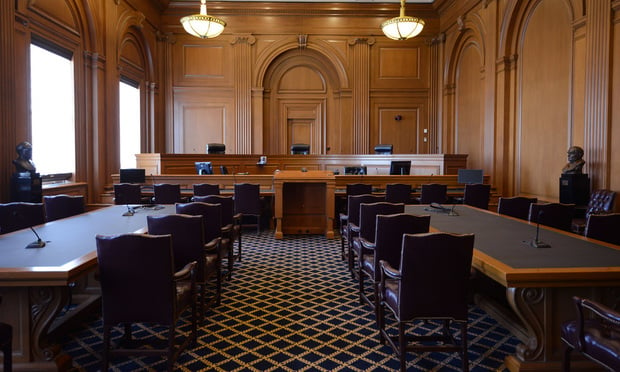Criminal Defense Lawyer Censured Following Second Circuit Discipline for Failure to Withdraw
Manuel Ortega, who has been licensed to practice law for more than 30 years, was publicly reprimanded by the Second Circuit, and barred from practicing before it, in March 2018.
March 12, 2019 at 05:53 PM
5 minute read
 A Second Circuit courtroom at the Thurgood Marshall Courthouse. Photo: Rick Kopstein/NYLJ
A Second Circuit courtroom at the Thurgood Marshall Courthouse. Photo: Rick Kopstein/NYLJ
A veteran Staten Island criminal defense attorney has been censured by a New York appeals court after not complying with rules and orders given to him by the U.S. Court of Appeals for the Second Circuit while representing a client on appeal.
Manuel Ortega, who has been licensed to practice law for more than 30 years, was publicly reprimanded by the Second Circuit and barred from practicing before it in March 2018.
Now, in a decision issued late last month, an Appellate Division, Second Department panel has censured Ortega based on the same Second Circuit conduct that occurred while he represented a client in her appeal from a 2014 criminal judgment sentencing her to five years in prison.
“Notwithstanding the mitigation advanced [by Ortega], it is undisputed that [he] … failed to properly withdraw from representation, failed to respond to inquiries by the Clerk's Office of the Second Circuit, and did not comply with the multiple orders from the Second Circuit, including orders directing him to file a proper response to the Government's motion to dismiss the appeal, and to appear for a hearing,” the panel wrote in its opinion that publicly censured Ortega as a matter of “reciprocal discipline … based on the findings of the Second Circuit.”
By way of explaining his Second Circuit conduct, wrote the panel, Ortega had acknowledged that he was not aware of all of that court's rules, including the rule that the trial attorney on a U.S. District Court criminal case is also the appellate lawyer unless relieved by the court.
In responding to a 2018-issued Second Department order to show cause regarding why or why not he should be disciplined, Ortega also told the Second Department that he'd prepared a motion seeking permission to withdraw as his client's Second Circuit counsel, but that due to procedural defects, the motion wasn't accepted for filing, the panel said.
Moreover, according to the panel, he explained that his family was experiencing personal difficulties, and when the Second Circuit disciplinary matter later came up, he did what he counsels clients not to do—he panicked and ignored the matter, and allowed the discipline to go forward without presenting a defense.
According to the unanimous panel of Justices Alan Scheinkman, Mark Dillon, Ruth Balkin, John Leventhal and Cheryl Chambers, the Second Circuit disciplined Ortega based on conduct that happened on the appeal in United States v. Berrio Restrepo (Gomez De Cavides).
The panel said Ortega was not a member of the Second Circuit's bar but that he represented the action's defendant pursuant to the Second Circuit's Local Rule 4.1. The rule requires the attorney who represented a defendant in a U.S. District Court criminal case to continue representing the client on appeal, even if the lawyer isn't admitted to that court's bar.
The panel noted that in a July 2015 order, the Second Circuit directed Ortega to show cause why he should not be sanctioned for failing to respond to Second Circuit orders and to multiple calls made by the clerk's office regarding his client's appeal.
Ortega also was directed to appear for a hearing pertaining to the July 2015 order, the panel wrote, but he never responded to the order or scheduled the hearing.
He also did not respond to Second Circuit orders directing him to file a proper response to the U.S. government's motion to dismiss his client's appeal, the panel wrote. And because of his defaults, he was then relieved as defendant's appellate counsel.
Subsequently, his former client proceeded pro se and defaulted on the appeal, resulting in its dismissal, the panel wrote.
In its final disciplinary order regarding Ortega, the Second Circuit reprimanded him and barred him from the practicing law before the that court unless he is first granted admission to the court's bar or granted leave to represent a party in a particular case, the panel said.
According to the panel, the Second Circuit had noted as significant aggravating factors, among others, “'the fact that the defaults described in the July 2015 order occurred in a criminal appeal, where significant liberty interests were at risk, … and the fact that [the respondent] has substantial experience as a lawyer.'”
The Second Department's decision listed in the disciplinary matter before it the grievance committee for the Second, Eleventh and Thirteenth Judicial Districts, and the opinion noted with reference to the committee, Diana Maxfield Kearse in Brooklyn, a chief counsel covering certain Second Department counties, as well as Sasha Holguin as an attorney for the grievance committee for the Second, Eleventh and Thirteenth Judicial Districts.
Ortega, who the Feb. 27 decision said was admitted to the state bar in the Second Judicial Department in 1987, represented himself pro se. He could not be reached for comment.
This content has been archived. It is available through our partners, LexisNexis® and Bloomberg Law.
To view this content, please continue to their sites.
Not a Lexis Subscriber?
Subscribe Now
Not a Bloomberg Law Subscriber?
Subscribe Now
NOT FOR REPRINT
© 2025 ALM Global, LLC, All Rights Reserved. Request academic re-use from www.copyright.com. All other uses, submit a request to [email protected]. For more information visit Asset & Logo Licensing.
You Might Like
View All
Paul Hastings, Recruiting From Davis Polk, Adds Capital Markets Attorney
3 minute read
Neighboring States Have Either Passed or Proposed Climate Superfund Laws—Is Pennsylvania Next?
7 minute readTrending Stories
- 1UK Firm Womble Bond to Roll Out AI Tool Across Whole Firm
- 2Starbucks Hands New CLO Hefty Raise, Says He Fosters 'Environment of Courage and Joy'
- 3Blockchain’s Fourth and Fifth Amendment Privacy Paradoxes
- 4Prior Written Notice: Calabrese v. City of Albany
- 5Learning From Experience: The Best and Worst of Years Past
Who Got The Work
J. Brugh Lower of Gibbons has entered an appearance for industrial equipment supplier Devco Corporation in a pending trademark infringement lawsuit. The suit, accusing the defendant of selling knock-off Graco products, was filed Dec. 18 in New Jersey District Court by Rivkin Radler on behalf of Graco Inc. and Graco Minnesota. The case, assigned to U.S. District Judge Zahid N. Quraishi, is 3:24-cv-11294, Graco Inc. et al v. Devco Corporation.
Who Got The Work
Rebecca Maller-Stein and Kent A. Yalowitz of Arnold & Porter Kaye Scholer have entered their appearances for Hanaco Venture Capital and its executives, Lior Prosor and David Frankel, in a pending securities lawsuit. The action, filed on Dec. 24 in New York Southern District Court by Zell, Aron & Co. on behalf of Goldeneye Advisors, accuses the defendants of negligently and fraudulently managing the plaintiff's $1 million investment. The case, assigned to U.S. District Judge Vernon S. Broderick, is 1:24-cv-09918, Goldeneye Advisors, LLC v. Hanaco Venture Capital, Ltd. et al.
Who Got The Work
Attorneys from A&O Shearman has stepped in as defense counsel for Toronto-Dominion Bank and other defendants in a pending securities class action. The suit, filed Dec. 11 in New York Southern District Court by Bleichmar Fonti & Auld, accuses the defendants of concealing the bank's 'pervasive' deficiencies in regards to its compliance with the Bank Secrecy Act and the quality of its anti-money laundering controls. The case, assigned to U.S. District Judge Arun Subramanian, is 1:24-cv-09445, Gonzalez v. The Toronto-Dominion Bank et al.
Who Got The Work
Crown Castle International, a Pennsylvania company providing shared communications infrastructure, has turned to Luke D. Wolf of Gordon Rees Scully Mansukhani to fend off a pending breach-of-contract lawsuit. The court action, filed Nov. 25 in Michigan Eastern District Court by Hooper Hathaway PC on behalf of The Town Residences LLC, accuses Crown Castle of failing to transfer approximately $30,000 in utility payments from T-Mobile in breach of a roof-top lease and assignment agreement. The case, assigned to U.S. District Judge Susan K. Declercq, is 2:24-cv-13131, The Town Residences LLC v. T-Mobile US, Inc. et al.
Who Got The Work
Wilfred P. Coronato and Daniel M. Schwartz of McCarter & English have stepped in as defense counsel to Electrolux Home Products Inc. in a pending product liability lawsuit. The court action, filed Nov. 26 in New York Eastern District Court by Poulos Lopiccolo PC and Nagel Rice LLP on behalf of David Stern, alleges that the defendant's refrigerators’ drawers and shelving repeatedly break and fall apart within months after purchase. The case, assigned to U.S. District Judge Joan M. Azrack, is 2:24-cv-08204, Stern v. Electrolux Home Products, Inc.
Featured Firms
Law Offices of Gary Martin Hays & Associates, P.C.
(470) 294-1674
Law Offices of Mark E. Salomone
(857) 444-6468
Smith & Hassler
(713) 739-1250








